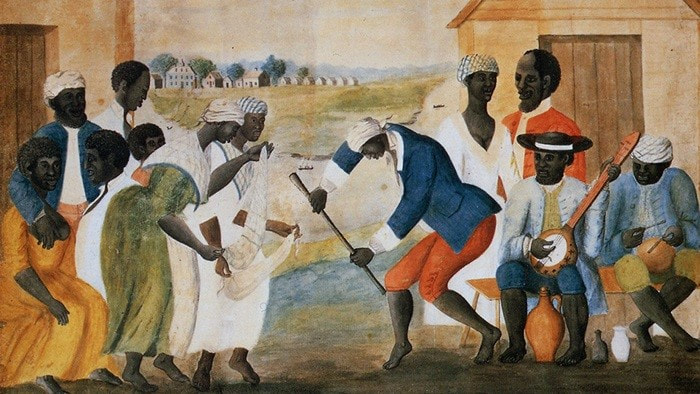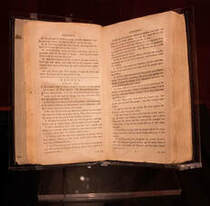|
If you are an African American, you’ve probably heard, or you may even believe something like: Christianity is a white man’s religion, created to keep black people in bondage, plantation owners indoctrinated slaves with their bibles to support slavery and keep the slaves in bondage. You have probably heard, or maybe even believe, that religion is just a way of controlling masses of people. Since I have loved ones who believe this way, I wanted to do some research for myself to see if there is any truth to what I keep hearing and where this belief comes from. I was surprised by what I found.  So, did African-Americans have their own religion before they were transported to America? One thing is certain: there are numerous "religions" in this age that claim to be the way, the truth, and the life that confirms what the scripture says. 1 Timothy 4:1 says, "... the Spirit expressly says that in latter times some will depart from the faith, giving heed to deceiving spirits and doctrines of demons, speaking lies in hypocrisy, having their own conscience seared with a hot iron, forbidding to marry, and commanding to abstain from foods which God created to be received with thanksgiving by those who believe and know the truth." In Ephesians 4:14, the Bible speaks of people being tossed to and fro and carried about with every wind of doctrine, by the trickery of men, in the cunning craftiness of deceitful plotting. We can see these scriptures being lived out before our eyes. When I think of the people who grew up in the church leaving Christianity, and embracing all manner of doctrines, claiming they have found the truth, it saddens me. I believe Paul was a little concerned also when he encountered the same type of people in Galatia, and he asked, "O foolish Galatians! Who has bewitched you? It was before your eyes that Jesus Christ was publicly portrayed as crucified. Let me ask you only this: Did you receive the Spirit by works of the law or by hearing with faith?" − Galatians 3:1-2 (ESV)  In my research, I found that there was indeed a "Slave Bible" titled, Parts of the Holy Bible, Selected for The Use of The Negro Slaves which is on display in Washington DC’s Museum of the Bible in 2018. The exhibition was called "The Slave Bible: Let the Story Be Told." The Bible is on loan from Fisk University in Nashville, Tennessee. According to the university, there are only three known copies of this Bible, and the one on display in Washington is the only copy in the U.S. The "Slave Bible" is not only noteworthy because of its rarity, but its content, or its lack of content. Anthony Schmidt, associate curator of Bible and Religion in America at the museum, says the first instance of this abridged version was published in 1807, three years after the Haitian Revolution ended. That revolution was the only slave revolt in history where slaves successfully drove out their oppressors and formed a new nation. Naturally, this made the American and European slave owners paranoid. They feared that their slaves would also one day rise up against them. According to Schmidt, the so-called "Slave Bible" starts off with the creation story, then jumps to Joseph getting sold into slavery by his brothers and how that ends up being a good thing for him. It skips over the part where God used Moses to miraculously deliver the enslaved Israelites from slavery. All other references that could have prompted rebellion or that referenced freedom were also omitted. For instance, Galatians 3:28 that says, "There is neither Jew nor Greek, there is neither bond nor free, there is neither male nor female: for ye are all one in Christ Jesus" was left out. Scriptures that reinforced slavery and submission were highlighted, such as Ephesians 6:5 that says, "Servants, be obedient to them that are your masters according to the flesh, with fear and trembling, in singleness of your heart, as unto Christ." Schmidt says, "The whole book of Revelation is left out also, so there is no new kingdom, no new world, nothing to look forward to." So, after reading all of this, my question was, if most slaves couldn’t read anyway, why create a false bible just for slaves? What would be the point of such a Bible? Did Africans have a religion before being brought over to America? In an article titled "The Slave Experience: Religion I read that at the beginning of the transatlantic slave trade, African religious beliefs and practices were numerous and varied. A good portion of the continent had, for centuries, fallen under Islamic influence, but what I found most intriguing was that the Christian heritage in Africa goes all the way back to the beginning of the Church, at Pentecost. The Bible states it right there in the Book of Acts, but I had never given it much thought until now. Basically, the lie is still being perpetuated. The freedom in Christ that the slave masters tried to keep people from back then is still alive... and unfortunately, people are falling for it hook, line, and sinker. "5 Now there were dwelling in Jerusalem Jews, devout men from every nation under heaven. 6 And at this sound the multitude came together, and they were bewildered, because each one was hearing them speak in his own language. 7 And they were amazed and astonished, saying, "Are not all these who are speaking Galileans? 8 And how is it that we hear, each of us in his own native language? 9 Parthians and Medes and Elamites and residents of Mesopotamia, Judea and Cappadocia, Pontus and Asia, 10 Phrygia and Pamphylia, Egypt and the parts of Libya belonging to Cyrene, and visitors from Rome, 11 both Jews and proselytes, Cretans and Arabians—we hear them telling in our own tongues the mighty works of God."" — Acts 2:5-11 (ESV) This scripture says men from every nation under heaven (country and race) were represented at the start of the church, and each person there heard the gospel message in their own language. That’s the power of God! No man can take credit for that! This fact also confirms that Jesus came to save all mankind (1 John 2:2). Dr. John Mbiti, in his book, "The Early Church in Africa," outlines the fact that the message of Jesus penetrated Africa long before it ever reached Europe. "Christianity in Africa is so old that it can be rightly described as an indigenous, traditional, and African religion," says Dr. Mbiti. The conversion of the Ethiopian eunuch described in the Book of Acts predates the Apostle Paul's first missionary journey into Europe by several years. There is clear, historical documentation of the church in Africa by the third century. Christianity was the dominant religion in North Africa, most notably Egypt. In fact, by the year 300 AD, Egypt had more than a million Christians. In the sixth century, Christianity spread to the Nubian Kingdoms, soon becoming the dominant religion. The Christian Nubian Kingdoms survived for 700 years, resisting attempted domination by Muslim conquerors for 600 of those years. So, when the Africans were transported to America, they brought with them diverse religious traditions. In the United States, the abolitionist movement, spear-headed by Christian people, protested against the slave trade, but there were also many people who claimed to be Christians who defended slavery. Missionary efforts were allowed among the slaves. Part of the rationalization of the slave owners was that "Christianizing" the slaves would make them better workers. What they didn’t count on was that the slaves would learn to read the Bible for themselves and discover that while the Bible did teach, "Slaves, obey your earthly masters with respect and fear," it also said, "And masters, treat your slaves in the same way. Do not threaten them, since you know that he who is both your Master and theirs is in heaven and there is no favoritism with him." (Ephesians 6:5-9) They discovered that the slavery referred to in the Bible was substantially different from what they were experiencing.
According to the article The Secret Religion of the Slaves in the Christian History Institute, slaves frequently held their own religious meetings out of disgust at the twisted gospel preached by their masters’ preachers. Lucretia Alexander, who was twelve years old when the Civil War began, explained that the white folks’ preacher "came, and he’d just say, ‘Serve your masters. Don’t steal your master’s turkey. Don’t steal your master’s chickens. Don’t steal your master’s hawgs. Don’t steal your master’s meat. Do whatsomever your master tells you to do.’ Same old thing all the time," she said. Because the slaves faced severe punishment if caught attending secret prayer meetings, they met in secluded places (woods, gullies, ravines, and thickets). Kalvin Woods remembered preaching to other slaves and singing and praying while huddled behind the quilts and the rags, which had been thoroughly wetted to keep the sound of their voices from penetrating the air and then hung up in the form of a little room, or tabernacle. Again, I find this amazing. Even though the slavemasters were trying to force a false religion on them, the slaves still heard their Lord's voice speaking the Truth. Jesus said, "27 My sheep hear my voice, and I know them, and they follow me. 28 I give them eternal life, and they will never perish, and no one will snatch them out of my hand." (John 10:27-28) This is the same Jesus that we serve today. Former slave John Brown depicted two extremes: "Sunday was a great day around the plantation. The fields was forgotten, the light chores was hurried through, and everybody got ready for the church meeting. It was out of the doors, in the yard. . . . Master John’s wife would start the meeting with a prayer and then would come the singing—the old timey songs. But the white folks on the next plantation would lick their slaves for trying to do like we did. No praying there, and no singing. Some masters did not allow their slaves to go to church and ridiculed the notion of religion for slaves because they refused to believe that Negroes had souls. Others forbade their slaves to attend church because, as an ex-slave explained, "White folks ’fraid the niggers git to thinkin’ they was free, if they had churches ’n things." (The Secret Religion of the Slaves) Meetings like this contributed to the growth of Christianity among slave populations. The slaves who turned to Jesus knew the difference between the Christianity they were seeing practiced and the Christianity they were hearing described in the Bible. They chose to follow the Jesus they saw in the Bible. So yes, it is true that there have been those who have attempted to justify their mistreatment of slaves on the basis of the Bible, but the same is true for today. The forces of evil have tried to discredit the Word of God since the Garden of Eden (Genesis 3). We cannot blame Christianity because someone twists and manipulates the Bible to suit their evil intent. So, for me, the thought that religion was only invented to control nations or groups brings more questions like, "Who is doing the controlling, and why are they controlling people?" Is it to keep people from stealing or killing, or to make them polite, honest, faithful, loving, patient, and kind? What’s the point of the control? Share your comments below: |
Blog Post Categories
All
|
 RSS Feed
RSS Feed